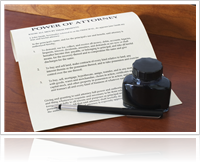The Importance and Dangers of Appointing a Power of Attorney

Throughout the nation, there has been an increasing focus on the importance of looking into appointing a power of attorney (POA) as an essential cornerstone to estate planning. This simply means that the principal (also known as the donor of the power) appoints someone known as the agent, to represent themselves in private and business affairs.
There are many different types of power of attorney that will all be best suited towards different situations for the principal. One of the most popular, however, is known as a durable power of attorney and refers to a POA that will become ineffective should the principle become incapacitated – either through serious injury, illness or death. In some situations, should it be clearly stated, the powers of the POA may continue regardless of incapacitation until the principal's death.
While this is a vitally important document, it is unfortunate to realize that the appointing of a POA does not always go according to plan. In fact, this is unfortunately a platform of exploitation, scam and fraud. The elderly can appoint a POA who only abuses the power – using it as a license to steal. It can become a vehicle of elder abuse and there are many banks who shy away from transactions completed using POA documents – attempting to protect themselves against the possibility of fraud occurring.
This is such a serious issue that the MetLife Mature Market Institute estimated in 2009 that on an annual basis there is a $2.6 billion loss to elders through POA-related fraud. In an effort to counteract this type of fraud and abuse, there are many different pieces of legislation that are being considered to provide safeguards, for example, requiring that the POA provides annual reports to an outside monitor.
Keeping in mind the importance of appointing a POA, it is not something that should be done half-heartedly. It should be done comprehensively, with considerable attention to detail. In the efforts to ensure that you move forward in the process as smoothly as possible, there are several different things that should be taken into consideration while appointing the agent, these include:
- Can you trust who you are appointing? This seems simple, but it should be the base of your decision. If you are not close with the person and do not have considerable trust in their ability to handle the decisions, as well as to look out for your best interests, you need to rethink your decision to appoint them as a POA. The best person for the job? A reliable family member who lives in the area.
- What types of powers will you grant? Not every POA is going to be the same. It is important that you consider just how much power that you will be grating to your POA and how much that they will be able to do. For example, differentiate between what powers the POA has and what your trustee has if you have established a living trust.
- Is the document effective from the moment of signing? You do not necessarily need to have the power of attorney effective from the moment that the ink dries, but it is something that you need to consider. There are two approaches that you can consider – you can either make it effective when you sign or you could make it effective when a certain event occurs, for example, if you should become mentally and/or physically incompetent.
The best piece of advice? Consider it early, work with a reliable attorney and ensure that you follow all state and federal guidelines. While there are dangers that should be thoughtfully considered, appointing a power of attorney can be an essential tool to both you and your entire family.
Posted on Oct 22, 2011 4:55pm PDT